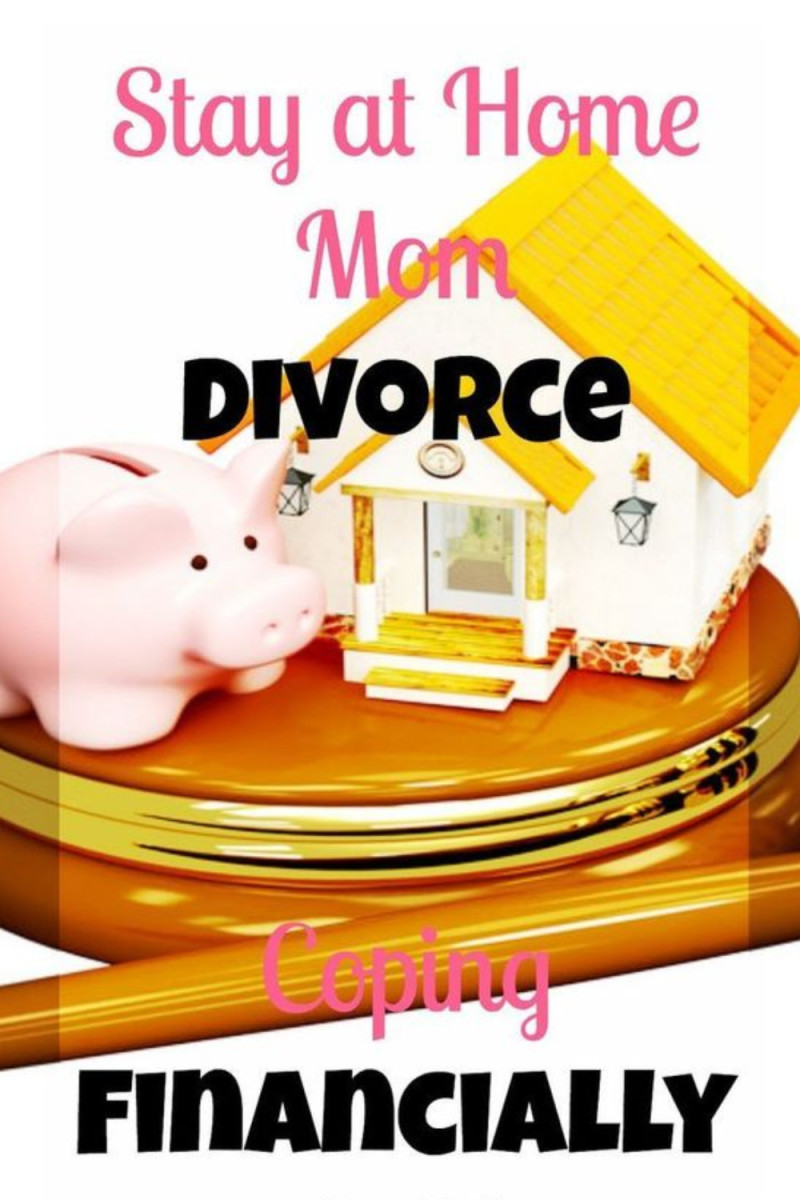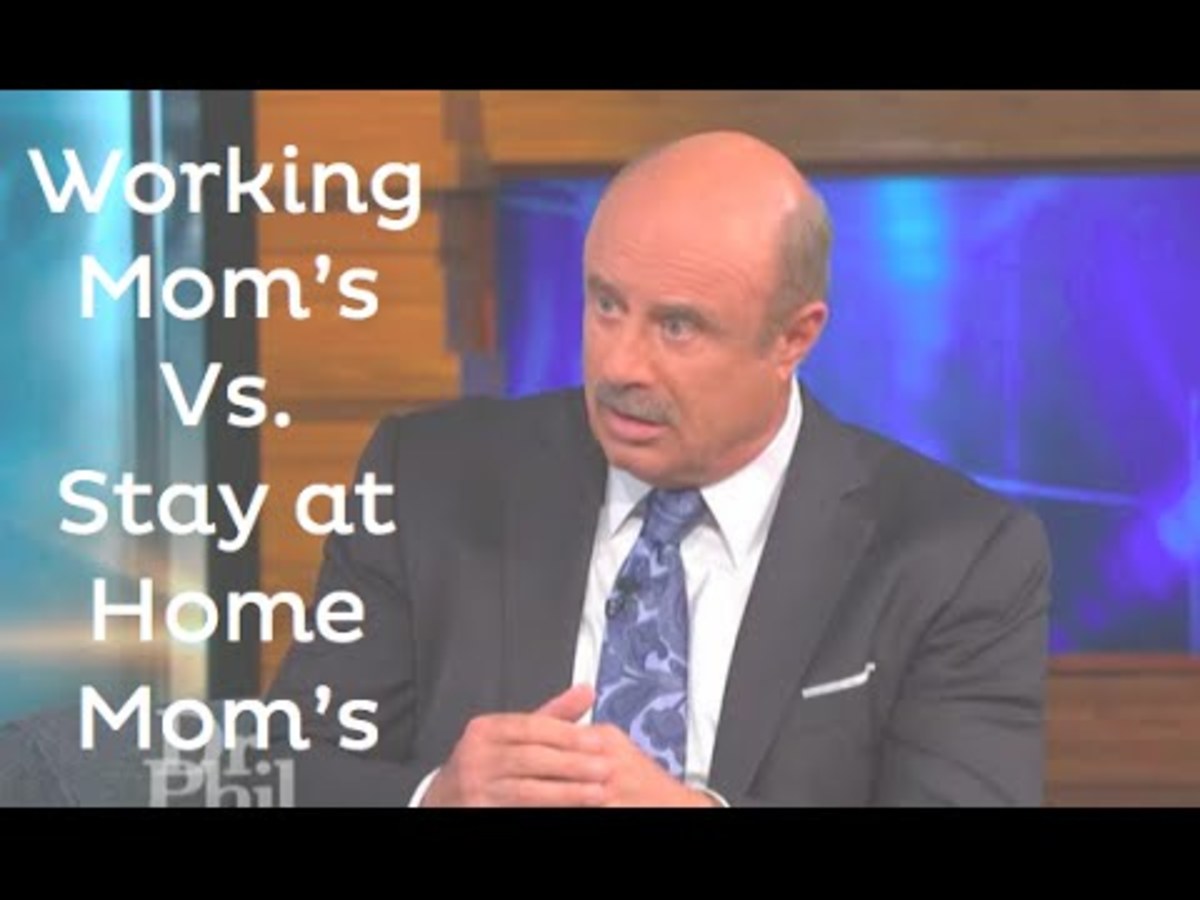How to like being a stay at home mom (more).
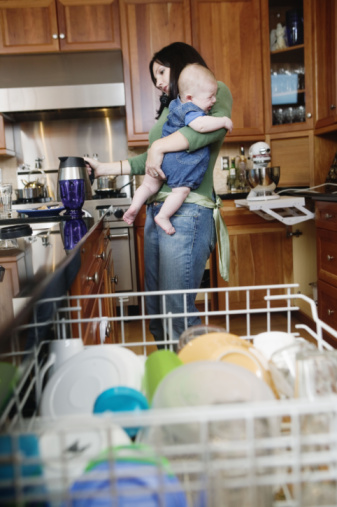

Accept yourself and mute the peanut gallery
You've heard the formula for happy at home right?
- Give it a year (or so)
- Meet other mothers
- Join Mommy and Me classes
- Commit to date nights and girls' night out
- Ask your spouse for more help at home
These are all stellar suggestions. Date nights, more help, check, check. And yes, when you get out of your four walls and meet other mothers you stop feeling isolated. Other mothers understand the unique joys of projectile vomit, cracked nipples and overwhelming exhaustion.
But if you’re like me nothing on the stay-at-home-mom (SAHM) checklist was ever enough to make me feel entirely at home -- at home.
Maybe you think you're the only SAHM not settled into her new domestic life despite your best efforts and feeling grateful. (Myth: at home parents believe because they're lucky enough to be at home, they should by default, love it).
Trust me, there are a lot of us out there.
My daughter’s seventeen so long gone are the days when I constantly compared myself to other mothers, silently obsessing that something must be broken with my parenting gene.
The fact is humans are innately social creatures. We live and breathe by comparing ourselves to others, watching social cues and group behavior. The flaw however, is although we want our kids to thrive and so we compare and contrast, what we don't realize is many paths lead to the same rainbow.
- Some women enjoy being at home more. No big deal.
The reality is some women make the transition to home better than others. They bid a happy farewell to their job or career. And if they spend 24/7 with their child, while it's hard for everyone, for some women domestic life feels like a natural extension to their identity.
For some women however, leaving a career and spending all day with a young child, despite the fact that they love her/him beyond comprehension, feels like a loss of identity. (Myth: Mothers who don't love being at home aren't as good as mothers who do).
There's no right or wrong here, it just is. Two sides to the same coin. Both loving mothers but different people.
To some degree you have to try to bulletproof yourself against public opinion. If you need more time to yourself and can swing it, do it. Hire a babysitter during the day. Enroll your kids in Mom's Day Out or if it's practical in terms of childcare costs, go back to work part or full time.
Okay, the reality is it's nearly impossible to ignore the snark passive aggressive comments you might hear. "Gosh Laura I could never leave my baby, you're stronger than me." The parent peanut gallery is mighty vocal, especially when we're brand new and scared we'll screw up our child forever.
I made unconventional choices other mothers didn't. I enrolled my daughter in Mom's Day Out when she was only 17 months old (I had to beg the director because the program started at 18 months. I guess she felt sorry for me).
When my daughter was three and four I enrolled her in two concurrent pre-schools (different days) so I'd have more time to write, etc. Try to imagine the comments from friends and even one of her teachers who asked if my child got "confused" by attending two pre-schools.
I went out monthly on date nights and girls night's out. And when my daughter was 3 months old I went back to work part-time for six months and I hired a nanny. Despite my "me first" behaviors, my daughter stands firmly happy, healthy, attached and thriving.
There can't exist a community more supportive and yet more judgmental than parents. We're a walking talking paradox because we crave love and support and validation while we sling "You shoulds" around at other mothers without feeling the shame it leaves.
The only thing we want more as new parents (than sleep) is to keep our baby alive and well. And so we're vulnerable to advice from anyone kind enough to give a reassuring hug and tell us it gets better (if we do x,y and z).
In the process of taking advice sometimes we sabotage our own reassuring guidance system.
I'm not suggesting you ignore useful advice. In-the-trenches wisdom can make the difference between your child finally drinking formula without spitting up, getting rid of a nasty diaper rash or napping another ½ hour during the day.
But when the advice comes at an emotional cost, when it moves into why you "should" breastfeed, ditch the pacifier or stay at home (and love it!) it's time to smile, nod and confidently hit the mute button.
My formula for being happy at home didn't look like another mother's formula for being happy at home, and the truth is, it didn't have to.
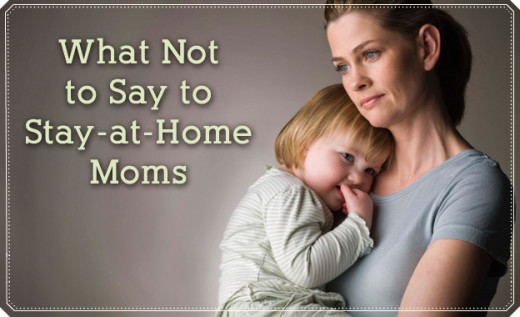
Do you like being a stay-at-home parent?
Your formula for being happy is your own
About six weeks after my daughter was born I fell into a terrifying post-partum depression that for a month or so hijacked all hope I was ever supposed to be a mother.
When I stopped breastfeeding and went back on my hormone replacement therapy (for a benign pituitary disorder diagnosed when I was 19) most of my despair disappeared but I wasn't so excited about the idea of being home full-time. After my three month maternity leave I went back to work part-time as my husband and I planned all along. Six months later however, I reluctantly quit.
Around the same time a doctor diagnosed me with Fibromyalgia. Everyday I was exhausted to the point where when I was home from work I had to lay in the afternoon (child willing). I felt flu-like aches all over my body and was plagued with a weird brain fog that made it nearly impossible to focus (p.s. I've long since self-treated and undiagnosed myself and am happily Fibromyalgia-free).
I felt guilty being away from my child three days a week when my paycheck barely covered the cost of our nanny. Ultimately I subsidized my sanity with only a few dollars a month to spare.
Our nanny Holly was a fifty-something lady who was gentle, caring and kind with our daughter but pretty quickly insisted on her way with almost every decision I made (how I should wash the baby bottles, how often I should fill the humidifier, why didn’t I buy the fruit she liked, and so on). Holly turned into a passive aggressive nudge until I dreaded seeing every day after work. To make matters worse, long time simmering issues at my office got worse until my incentive to stay was nearly nil and so I left.
When the honeymoon at home wore off after a couple months I realized even though I was lucky to have the choice to be with my child 24/7 I wasn't adapting to full-time domesticity. I followed friends' advice and joined multiple play groups, signed up for Mommy and Me classes, made time for myself, asked my husband to pull his parenting and household weight (which he always did) and went out on regular date nights.
Everything helped connect me to the outside world but these were temporary fixes to what I later realized was at the heart of my discontentment: I needed more time to myself and I needed a career I could manage from home.
My formula for being happy at home didn’t look remotely like another mother’s formula for being happy at home but the truth is, it didn't have to.
I knew I was a responsible loving mother but I wasn’t thrilled about being at home full-time or about going back to my former job. I felt like an impossible to please ingrate, never quite enough compared to women who seemed to take motherhood and domesticity in stride.
It took me a while to realize that I had to accept how I felt about the physical and emotional changes that come with motherhood. I had to address the radical metamorphosis going on in my mind and body and in my case this meant I needed to re-balance my hormones and my brain (I was long prone to mild anxiety and depression). I got on bioidentical hormones (and off my long time synthetic hormones). I took targeted supplements, improved my nutrition, started to exercise, and dove into inspirational and spiritual readings.
Once I realized my ambivalence had nothing to do with how much I loved my child or my parenting skills, and everything to do with re-balancing my life I made peace with the fact that I'd never fit the stay-at-home mother mold.
Opening up to other mothers saved my sanity. I decided I needed to write and to talk to other mothers about my former depression, my frustration, my boredom and my feelings about being at home full-time.
Most women seemed to understand or at least they were nice enough to pretend they did but I sensed most couldn't connect to my deep down craving to retain a part of myself in addition to being a mother.
I remember one warm-hearted lady named Alysse in my very first playgroup. One morning she told everyone how on her first day back to work after maternity leave, fifteen minutes later she sat in her cubicle, sobbed and then ran into her boss’s office and quit.
Without question, these women saved my sanity. They were a weekly life line of advice and support yet most of them never hired a babysitter or left their child for a night out with anyone, even a trusted family member.
For them, 24/7 self-sacrifice was the natural response to motherhood but to me it felt suffocating. I sensed in them an embedded belief that children couldn't possibly turn out alright unless their parents threw their entire uninterrupted selves into their lives. And so I had to wonder, if all these women felt this way and I didn’t, what was wrong with me?
Victoria Costello writes in her PsychCentral article, Five ways to create a secure attachment with your baby without sharing your bed, ”It’s unfortunate that this science has recently become synonymous with one particular parenting philosophy, specifically the school of thought that says (or has been interpreted as saying) that mothers must abdicate their need for alone time and do absolutely everything — including sleep — with their child or children in order to form and maintain a secure attachment with them...Attachment cannot be reduced to constant togetherness…”
I'm not knocking attachment parenting. I'm not knocking parents who don't do attachment parenting but who prefer not to leave their little ones. No one way to raise kids is the way. What I'm saying is that constant mother-child togetherness isn't the only pathway to a healthy attachment, nor does it feel natural for every woman.
Be honest with yourself.
Mothering has historically been a fertile breeding ground for women to pretend they feel one way when they feel another, and I'm not talking about loving our children, of course that's real.
Despite our buzzing community of online confessions over the past twenty years, face to face most mothers still grin and bear through anxiety and depression and boredom and anger and frustration just as their foremothers did because it we admit our squirrely feelings we might be judged as unworthy to parent life's most precious gift.
But the big beautiful truth is the more vulnerable and courageous you are, odds are you’ll meet another mother (or two or ten) who feel exactly as you do. Like dating, meeting like-minded parents is a numbers game. Put yourself out there and eventually you'll find a kindred spirit.
You might also meet mothers who after you confess the real deal that is you, think you’re a selfish maternal flop because you bottle feed, leave your children with sitters, soothe your baby with pacifiers, work or admit you're bored at home.
Still, honesty is worth the self-exposure.
Ambivalence, having simultaneous conflicted feelings, is intensely unsettling unless you reconcile with the natural yin and yang that defines motherhood. If you feel mixed emotions, congratulations, it means you're paying attention to yourself and to your child. You're not numb; you're alive and kicking and wonderfully human.
One minute you stare at your baby’s perfect toes, giddy that she held up her heavy melon head or that she focused her hazy blue eyes on you and the next minute? You heave sob as you drive to the store to buy more formula because your breasts “failed” and you can’t remember what day it is or if you turned off the stove or if you can handle one more hour of crying or solitude away from a career that took you years of school and corporate hard knocks to earn.
To top it off you chose to be at home but the walls of loneliness and boredom feel like they’re sucking the marrow out of your spirit. Meanwhile except for the sanctioned complaint of exhaustion, most mothers won't cop to being mind-numbingly bored at the routine, ticked off that their baby screamed for two hours or that they secretly want to high-tail it back to work a couple days a week.
I once jokingly told a close friend that weeks back I wanted to “spear chuck my daughter” because she didn’t stop crying. Sometime later In the conversation I mentioned I probably would only have one child.
"Um yeah, I think it's probably a good idea since you wanted to spear chuck your child," she said in a far too serious tone.
I’m fairly certain my friend knew I didn't literally want to use my daughter as a javelin but that I threw in some comic relief to describe a particularly hellish day at home. But from time to time my unfiltered honesty and sarcasm hit so close to the bone that occasionally a mother deflected her own unsettled feelings by outwardly judging mine.
These are the moments when you need to don your mental armor and settle into this idea: The mother who "doth protest too much" about what you're doing (or not doing) is likely grappling with her own issues she has yet to express out loud.
I finally made peace with the fact that I didn't fit the stay-at-home mother mold once I realized my ambivalence had zero to do with how much I loved my child or my ability to parent, and everything to do with accepting myself and creating balance in my life.
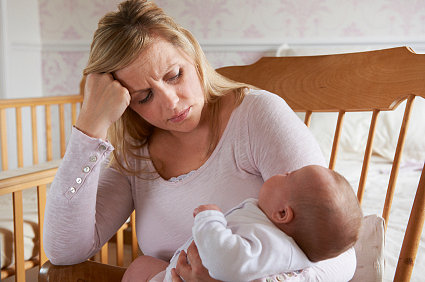
Some women just adapt better at home, no big deal
If you’ve been home for a while and you still feel like a stranger in a strange land let me make it easier for you.
It's like you want to love your new life but you can't; you just love your child.This is a simple fact, not a judgment.
You love seeing her walk and talk and smile and when she falls asleep on your chest. The beauty and stillness and spectacular life you made (or adopted) calms you into a resolve that this is exactly where you need to be.
You love your Tuesday Kindermusik music class, your Thursday playgroup and when your toddler grabs a fist full of Cheerios and giggles before she throws them to the dog. You love the small park down the street with the yellow bucket swings and that every time you read the Elmo book she claps her hands on page 3. But as for the rest of your daily routine?
Eh, not so much. Does this mean the happy-at-homes are superior mother material? Nah.
The truth is love for your child isn’t measured by how much you love or loathe (or sorta like) being at home. I find it interesting that society looks at stay-at-home dads, some who might not be ecstatic at home, as heroic. But take the mother who admits she’s going batty with bottles and bibs all day or that she wants to go back to work? She's ungrateful and maternally lacking.
Somehow we let stay-at-home dads off the hook because they seem courageous. But no parent regardless of their gender, falls seamlessly into the day to day domesticity that abruptly replaces the mental stimulation of banging out a project on Power Point or an adult-only lunch break.
I’m a big fan of looking for slivers of gratitude in our day to day. When I looked into my baby's blueberry blue eyes those moments were breath prayers of thank-you. But gratitude, despite it's magical power to transform and uplift isn’t the cure-all for finding peace at home.
Accepting how you feel and then making practical life changes -- is.
When my daughter started middle school and I was less involved in volunteering at her school I appreciated being home more because I had more freedom. Today I can’t imagine being any place else. I get ample time to myself and I get to see my daughter when she walks through the door after school. But as I mentioned earlier I had to put two critical pieces into place first or I guarantee I would have gone back to work in some capacity.
First, I needed more time to myself. How much time doesn’t really matter; I just needed more.
Second, I needed a career I could manage from home. This is one reason I left marketing and turned my long time passion for writing into a part-time profession. I also had a relentless need to put my feelings on paper so I could unravel my conflicted feelings about motherhood.
In the end, no matter how I sliced and diced and justified and explained, I knew some women just did better at home than I did, and this turned out to be more than okay. It's like the parent who makes homemade cupcakes vs the parent who buys the pre-made ones on her way to school. Either way the kids get to sink their teeth into mounds of sugary icing and moist cake.
The same reasoning applies to raising kids. However you get it done, shortcuts and all. If you take time away from your child to work or get a massage or or read a book or stare at the sky, your kid still loves you and you still love her. If your friend is better at 24/7 parenting, so be it. You might be better at picking out awesome cupcakes.

Mothers who love being at home aren’t better parents (or worse)
You might have a sister, best friend or neighbor who seems like the quintessential stay-at- home mother. Rest assured they deal with their share of madness. They have mornings when they wake up to the screaming sounds of their 2 year old whacking their four year old over the head with a sippy cup.
They cringe through piercing half hour toddler meltdowns in the middle of the mall and want to run away when their 3 year old throws her plate on the floor. Like you they wake up worried about battles over meals and naps and playgroup biting and wonder if they can take another day of the push-pull of toddlerdom or the monotony of Chutes and Ladders. Every frustration overwhelms them just as much as they overwhelm you, the difference is these moms probably can’t imagine (even on their worst day) going back to work, while some moms literally dream about it.
This is not a big deal. The fact is most parents work. The fact is some parents stay at home and love it, some don't.
I won't get into the math of proper parenting, how many hours a day you need to spend with your kids that is the “right” amount. Piles of parenting experts will gladly tell you what you’re doing right or wrong. One study refutes another and what’s popular today will replaced by a new trend of stellar parenting tomorrow.
I think anyone raised with relatively functioning parents knows the basics. Children need a sense of security, safety, love and constancy. They need certainty and continuity which isn't to imply kids can't have multiple caregivers, of course they can. The village loves our littles and loves them big, but kids, particularly infants, do better when the same caregiver(s) love on them week after week after week.
About a year after I joined the Moms Club I co-founded the Orlando chapter of Mothers & More, a national support group for mothers at home, at work or in-between.. A local mother who lived nearby and I met and we organized a chapter with help from other interested women.
Every once in a while I moderated discussions at our monthly meetings. One night my topic was about making the transition from work to home. How did the women feel about leaving the workforce? How did the working mothers feel about not being home? What did they like or not like about their situation? Did they have any advice?
Most of us admitted we were ambivalent.
After the meeting I asked a woman who was quiet the whole night what she thought about the discussion. Caroline is one of those incredibly gracious women you can’t help but compare yourself against. I actually use her as a noun. “Oh she’s a Caroline,” patient, non-judgmental, open-minded, compassionate, an active listener, someone who never says a nasty word about or to anyone.(And she's beautiful and has great hair).
“How’d you like the discussion?” I asked.
“I liked it but I have to say I kind of felt guilty listening to everybody because I like being at home. I sort of felt like I should be a little unhappy about the situation but truthfully, I’m not.” she said.
I apologized profusely for making her feel like something was wrong because she loved being home. I told Caroline that I envied her peace of mind and that I only wished I felt that settled in.
It’s exactly this kind of unintentional division among mothers (sometimes very visible and very intentional) that makes parents with a different point of view (but common end goal) get defensive or quiet.
Mothers happy at home are just as entitled to their feelings as mothers grappling with the transition. Unless we accept both realities we might inadvertently shame a mother into silence.
And so as mothers we declared our manifesto: We can love our child but not love all the pieces and parts of motherhood. This was our declaration of independence from shame, not a confession of maternal sin.
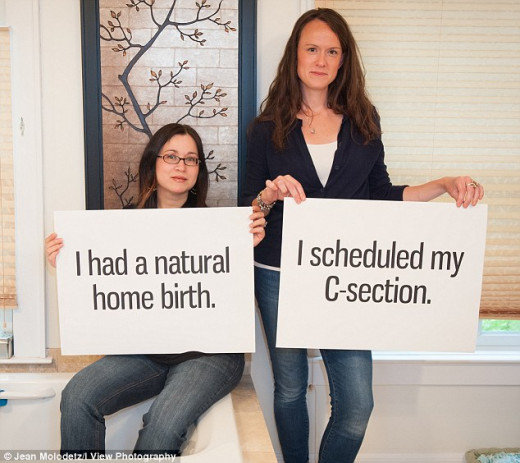
Do you feel judged by other parents?
Become bullet proof to the “momparisons”
As more and more members joined Mothers & More we eventually created our own mantra, "We believe a mother's happiness is as important as her children's."
We weren't a defensive tribe of anti-establishment moms. We didn't haughtily declare that parenting shouldn't have hard work or sacrifice or dirty diapers or piles of laundry or dishes or meltdowns or doctor visits or anxiety or exhaustion or sagging body parts or lagging libido or fits of frustration.
With big love we knew came big work.
Instead we unapologetically declared our manifesto: You can love your child but not love all the pieces and parts of motherhood. This was our declaration of independence from shame, not a confession of maternal sin.
My honesty didn’t however, always strike a compassionate chord. I once told a woman in one of my exercise classes at the YMCA that I dreaded summer vacation unless I enrolled my daughter in a couple summer camps. I explained that my husband and I planned at least one family vacation and gave our daughter plenty of unscheduled down time throughout the summer.
“Oh not our family. We don’t do camps.” the woman said. “I guess I’m one of those parents who really likes spending time with my children during the summer.”
I was sure I didn’t say I don’t like spending time with my daughter. I said I like spending time together and having some time to myself. But here’s the thing, from the moment my daughter was born my version of inner equilibrium felt like a natural pendulum swing: some time together, some time apart.
I held my child then put her down. I cuddled my child then put her in her swing. I played with my child then put her in her walker. I rocked my child then put her in her crib. She, then me., then Us.
You might not be the kind of mother who makes her own baby food, uses cloth diapers or wants her baby strapped to her chest 24/7. Whenever I tried to use a baby sling I ended up taking the thing off and laying it on a chair. I wrapped my daughter inside this cloth cocoon and sometimes she napped then and there. I don't think I failed at attaching to my daughter I failed at wrapping a denim-colored flimsy cloth around my chest with a 10 pound child tucked inside. I never was very mechanical.
When our daughter was about 3 weeks ago my husband and I went out on our first date, a 45 minute rushed dinner at a local restaurant. Even though we left our child in the capable hands of my father and step-mom I was still too nervous to fully enjoy the evening. I am glad however, we set a date night precedent so early on. Because here's the thing, most of the stay-at-home mothers I knew didn't leave their young babies. And so this big battering voice inside my head said I was selfish for leaving my child, while this tiny honest voice soothingly nudged me along with, GO girl, do your thing, your child is okay.
If you could peek into the future of your children's lives and see that taking some time away from them wouldn't turn them into emotionally detached deliquents, you would in one moment be at peace. I can comfortably testify that my child and my working friend’s children seem to be doing beautifully. Our kids were loved and surrounded by a village we carefully and constantly vetted, a village who deeply cared for their livelihood and our own.
But it’s nearly impossible to be objective when we're head deep in fear of failure about our kids. In order to reconcile how unsure we are we compare and contrast parenting choices based on how well one child behaves over another. We attribute success and failure to parenting styles and of course, to the fact that we're at home.
We validate that the decisions we make today must be the best because to think otherwise leaves too much margin of error. We have to tell ourselves what we're doing is the ultimate parenting pathway so we can push past feeling anxious or overwhelmed or isolated or frustrated or sad or bored. Sacrifice until it hurts we tell ourselves, is the highest maternal offering and so, the only true sign of love.
We stay-at-home moms like to think that what working parents reap in money and career and mental stimulation, we make up for because we get to witness our child’s first and every milestone.
And the fact is this is a very real trade-off.
The parent working to pay her mortgage knows this. The parent working for extra money or for her mental stimulation knows this even more. Choice comes pre-loaded with decision anxiety and it doesn't help when someone criticizes what we chose.
Nevertheless, if you have to work in some capacity or if you want to work in some capacity or if you want to take some time away from your baby just to recharge, ignore the critics (family, friends, neighbors) and just do it.
A happier person is a better parent.
It’s critically important to firmly yet politely keep the naysayers from ruining your resolve. I once mentioned to a former playgroup friend that when my daughter was three I enrolled her in two pre-schools at the same time (on different days) so I’d have more time to write and do errands etc.
“Huh. That’s certainly different,” she said, barely disguising her disapproval, “I’ve never heard of that kind of arrangement.”
I was the only stay-at-home parent with this arrangement (that I knew of) but I hardly considered it toddler neglect. I did what working parents did except my daughter only spent a few hours Monday and Tuesday at one pre-school and a few hours Wednesday through Thursday (the next year I added Friday) at another pre-school. For the most part she adjusted very well although like most young children she had her tough days and sometimes cried when I left.
Every once in a while I showed up to the bigger of the two pre-schools so I could be a fly on the wall and see if my daughter looked happy and engaged, which invariably she did. Her two teachers reassured me she was adapting well and that she stopped crying the moment I left.
If her teachers weren’t worried, I told my husband who was concerned about the schedule, why should we worry?
A mother I knew from another playgroup after I told her about my unique preschool arrangement said, “Well at least you did it so you could write not just so you could get your nails done because I didn’t have kids so someone else could raise them.”
I laughed and told her “Really? I did. I had kids so someone else could raise them” but she wasn’t amused. “Actually I’d probably do both,” I added, “I'll get my nails done (I never did get my nails done back then) and write,” either way I told her, I needed more time to myself.
You’d have thought I dropped my child off with a guy I met on the side of the road so I could go party at the beach.
The thing is you don’t need permission to take time away from your kids even if all you do is stare at the sky or to read a book while your kids are cared for by loving, responsible others. Permission is granted by the fact that you’re human and therefore worthy of rejuvenation and re-connecting with yourself.
This isn’t a universally shared parenting philosophy and it doesn’t have to be, just know that the desire for separation isn’t the mark of a selfish, lazy parent.

Mother: To thy self be true
Nina Barrett, author of I Wished Someone Had Told Me: A Realistic Guide to Early Motherhood, compares the motherhood transition to child birth, "Just as my body had stretched and ached to bear this child, so my whole life, my relationships, my ambitions and my self-image, would have to rework itself around the baby's presence."
So, who are you now that you’ve left your career?
Did you suddenly put all your other identities (woman, spouse, daughter, friend, engineer, manager, accountant, writer, artist etc.) on a shelf so you could focus 100% on your child? The better question is after 25, 30 or 40 years are you supposed to just slough off the many layers that make you, you?
For some women the answer is decidedly yes, for others, not so much.
Add to the guilt some people give SAHM's for getting baby-sitters or putting their kids in Mom's Day Out, or deciding to go back to work, the dialogue I've heard that all this motherhood angst chatter is just a big old self-indulgent rant.
It made me cringe when I read it, commentary over the years from various journalists who wrote that mothers of little means hardly have time for this “Oh poor bored me at home” nonsense. To parents scraping by, trying to pay the rent and feed their kids, mother ambivalence sounds like a bunch of over-privileged whiny women with too much time on their hands hanging out at the playground.
And sure, you can’t argue that hand to mouth survival trumps emotional angst among mothers with the financial freedom to stay home. But this article isn’t about what should matter to all parents, it’s a conversation about what does matter to some parents.
And ambivalence no matter where it comes from is a natural by-product of motherhood so frankly, all the dialogue counts.
It’s impossible to raise a child without wondering if you’re doing something wrong. It’s impossible to raise a child without wondering how to balance your child’s needs, your needs and your spouse’s. If you weren’t craving some kind of equilibrium I’d guess you’re living in silent seething resentment.
And as long as I’m talking about letting other parents' opinions bounce off you like rubber bullets here’s another one: Mothers at home eventually need to go back to work to keep women’s voices represented across all sectors in society, says Facebook’s COO Sheryl Sandberg who wrote the book Lean In: Women, Work and the Will to Lead.
While I agree women need to be (more) represented in leadership roles and that our voices are critically important to a fully functioning and equitable nation, mothers at home can indeed, make their voices heard.
Parents can volunteer. Parents can become online or in person activists for causes that shape the nation. Parents can form local or national support groups. They can join board of directors or become involved with political efforts that directly impact women’s and families’ lives. The unpaid opportunities for mothers at home with a few hours a day to spare (stop laughing, it's possible) are endless.
Now that I’ve talked a little about the mindset to feel a little more at home, at home, here’s a few concrete suggestions:
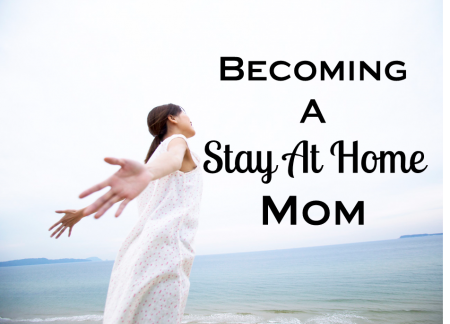
Do a climate survey (checking in with how you feel)
I know, weird title. Let me explain.
Take a few minutes and do what I call a "climate" survey on yourself. This is an actual device used by corporations to gauge their employee's overall satisfaction and to spot red flags so they can improve employee satisfaction, productivity etc. It's a sort of checks and balances for what's going on so small problems in a department don't become gigantic problems.
Translate this concept into how you feel about being at home and you've got a good starting point to make some happy dance changes.
Ask yourself the following questions. Don’t think about how your friend or mother or sister might answer, write the first thoughts that come to mind.
- Are you happy being at home full-time? If not, why?
- For the most part are you happy being alone with the kids most days or do you crave more adult interaction? (playgroups, meet-ups, Mommy and Me classes etc)
- Would you like to go back to work in some capacity? If so, when and what would you do?
- On the whole, do you feel supported, validated and respected by your spouse? If no, why not?
- Do you feel your spouse contributes (enough) to the household and childcare duties?
- Are you struggling with chronic anxiety, depression, bi-polar disorder, OCD or an untreated physical issue? If so, are you getting help?
- Is there anything you’d like to change about your current circumstance as a stay-at- home mother? What are some immediate and practical steps you can take?
So now you have this internal survey for how you feel but what do you do with it?
Sit down with your spouse and hammer out next steps, practical changes. Maybe you want to hire a babysitter during the week (post in your neighborhood newsletter or find a retired lady in your neighborhood, a grandmotherly type just dying to help out. Contact your local college to see if they have a child development program and hire an Early Education student (wanna-be teachers always turned out to be my favorite babysitters). Post a flyer at local pre-schools. Co-op with a friend. Watch her baby for a few hours one week so she'll watch your baby the next.
Maybe budget for a monthly housekeeper. Hammer out what expenses you can afford to cut to cover the additional $65-$125 a month. Ask your spouse for more help at home and with the kids. Consider going back to work part-time if financially this makes sense (childcare costs often eat into part-time profits). Even if you only break even, it might be worth your sanity.
This next part goes without saying: I'm sure you're uber grateful that you have the choice to be at home. Sometimes SAHMs get the gratitude guilt card thrown their way. Ignore the guilt. Because gratitude won’t help you with the kids or make dinner. Gratitude won’t budget for a housekeeper or an afternoon babysitter or find you treatment for anxiety and depression.
Asking gets. So ask, you deserve it.
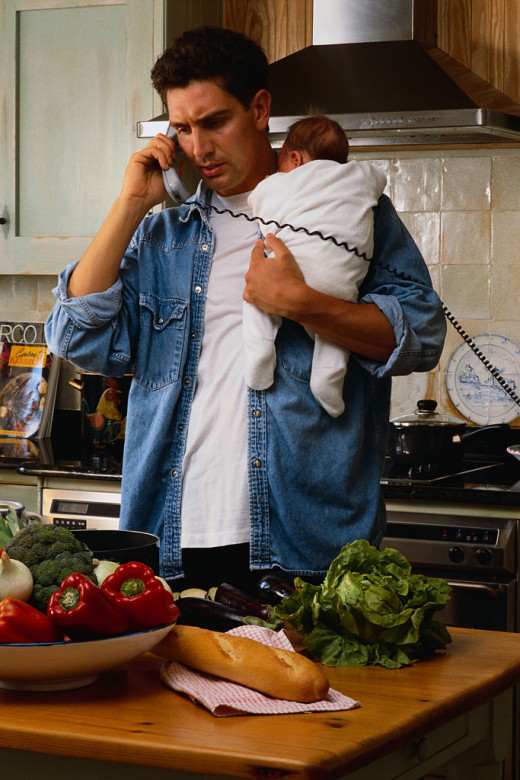
June Cleaver is gone: co-parents learn to cooperate on ALL the responsibilities
Long gone are the days when Father Knows Best and June Cleaver hands her husband Ward the newspaper so he can relax after work while she tends to the cooking, cleaning, children and errands all the while applying a new coat of lipstick and a crisp apron over her lovely frock.
Co-parenting means sharing the child care and sharing the vast number of family responsibilities in and outside the home. Couples who manage to create a mutually acceptable and flexible arrangement usually avoid leaving hidden resentment on the table to seethe, simmer and eventually implode.
But what's a fair arrangement look like? It depends, only you and your spouse know.
I have friends who lean traditional. Mom does the lion share of the housework, cooking and errands but Dad is a loving, involved parent after work and on weekends. The arrangement seems to be (for the most part) what each wants.
What's fair is what "gets it all done" without someone feeling they're (always) coming out on the short end. What works is whatever distribution of duties is practical and equitable. The reality is however, sometimes the split won't be even remotely fair and sometimes it will.
Say for example your spouse travels two days a week. There's no way he can pitch in as much as you'd like. He can however, make up for his absence on the weekends and take the kids for the morning or afternoon, help clean the house or agree to budget for a monthly or bi-monthly housekeeper or weekly babysitter. (See how I keep mentioning monthly housekeeper?).
My husband Andy and I have our own unique arrangement. We both work from home. We both agreed to budget for a bi-monthly housekeeper (I swear I'd sacrifice my meal before I’d give this up and my husband liked this idea better than helping me clean the house on weekends).
He and I both carpool. I do 99.9% of the cooking but he regularly picks up dinner. I do all the grocery shopping but he, my daughter and I share kitchen clean up, emptying the dishwasher and we all do our own laundry. Everyone is supposed to pick up after his/herself but I know you know how that goes, a work-in-progress and practice for my patience.
The laundry situation in my house always seems to surprise people and I'm not exactly sure why. When I met my husband he did his own laundry so I never saw any good reason to change this arrangement simply because women have traditionally been the keepers of the washer and dryer duties.
His home office (also his man cave) is permanently a pile of papers and magazines and an overflowing waste paper basket and cups and and ... I’ve learned to (mostly) ignore the mess that makes me visibly twitch, a mess that Andy explains is his organized chaos, and that if I clean it, inevitably comes undone an hour later.
Frankly, this man lives in a peaceful mess I simply can't understand. I live in reasonable (but not compulsive) need for order. For the most part we meet in the middle where our common living spaces collide. I also turn a blind eye to my teenage daughter's room until one day I can no longer take it and I bark orders to clean. Sometimes she surprises me and comes out from under the piles and cleans without being told. We all have our set-point for order, the key is to negotiate what's acceptable, what's not.
There’s just no "right" division of labor for couples/parents except if one of you begins to feel chronically taken for granted. If you do, it’s time to figure out where to make some realistic changes.
Your spouse might feel you don’t appreciate his side of the story because he works 10 hours a day and needs to decompress when he gets home (which he does). But your immediate need to decompress likely trumps his. The reality is you've been alone with a crying baby and active two year old almost all day and you’re just about to lose your %$^&# if you don't get some time alone.
Your spouse on the other hand is stressed out. He feels a major financial squeeze after baby number two and some recent home improvements. He's also dealing with an office full of incompetent nimrods. But here's the thing, even the worst boss or annoying colleague offers adult (albeit bad) company, and your husband had time to himself during the commute home.
Both points of view are valid, both of you benefit by compromising.
Maybe in exchange for letting him decompress first two days a week he agrees to budget for a housekeeper which relieves hours and hours of housework. For every hour you’re not cleaning, you have more time for you, the baby, your projects, an online class, updating your resume, whatever. (Well worth giving up a night out or cutting out any other luxury that equals a monthly or bi-monthly housekeeper).
To assume that stay at home parents should do all the housework is in my view, a dated expectation. Your primary job is to care for your child but sure, the home comes with the territory. You’re job isn’t however to take it all on by yourself. You’re a domestic manager which means you do what all good managers do, delegate and share the load.
But again your arrangement isn't for me to decide. What feels equitable is what's practical and fair from your perspective.
If you want some more time to yourself consider asking family or friends to babysit or hire a babysitter a couple times a week so you can run errands, go jogging, go to the mall, get your nails done, have lunch with a friend, etc.
Whatever you decide, forget about what you think qualifies as “enough of a reason" to leave your child for a few hours. If you need time to yourself and you have trusted caregivers, go for it. For every disapproving look you (might) get from a parent, rest easy knowing you're doing the right thing for your family, which by the way, includes you.
Maybe you've thought about working from home or going back to work in some capacity. Calculate if you can afford the “cost to work” which includes gas, possibly dry-cleaning and the biggest expense of all, childcare.
Maybe you want to switch careers and to enroll in classes online. Maybe you want to organize a neighborhood walking club or join an affordable gym that offers childcare.
Whatever pops into your mind from the questions I listed above, listen to your answers. Feel your emotions nudging you along to pay attention.
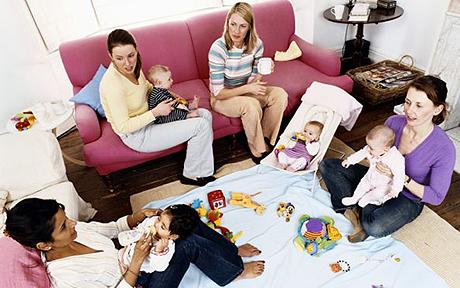
Mom to mom: Make compassionate connections
Nothing spells relief like connecting with someone who's navigating the same territory you are this very moment. Connecting with other parents is mandatory in stay-at-home world. I mean this is sanity saving strategy 101 for making the transition to home feel even remotely do-able.
Gwen Dewar in her article, “Which comes first, the unhappy baby or the unhappy parent,” suggests, “Don’t get isolated. The research is pretty clear on this point: Parents are more likely to get depressed when they lack social support. In many Western countries, parents of young babies--especially mothers--spend long hours in isolation with their infants. Anthropologically speaking, that’s pretty weird. In most small-scale societies, mothers are virtually never left alone with their young infants."
When you open up to another mother and she nods in compassionate agreement you suddenly feel your pressure valve release a tiny bit and you feel less alone.
I personally think it's a good idea to look for concrete parenting advice within your own generation. Please hear me out before you think I’m dissing our wise and wonderful foremothers. Your parents, grandparents and aunts have priceless pearls of parenting wisdom about the age old basics of babies, but they're far too removed from your generation and style of parenting to talk you off every ledge (“In my day we didn’t hover over our kid’s every move. We let them cry it out.”).
Okay admittedly we're the "helicopter" parents to the nth (I hired a safety expert to baby-proof my house when my daughter was 5 months old), but so what? Every generation is entitled to their bouts of hysteria and lessons learned.
Older generations are just too removed from the day to day emotion and frustration of potty training, melt-downs, pre-school jitters, pacifiers, pediatricians, missed milestones to offer in the trenches advice and live-time empathy. Although on the other hand, cooler heads prevail and so seasoned mothers also have the advantage of experience and emotional distance to offer their calm and (hopefully) objective perspective.
So where do you meet other mothers?
You meet them where parents naturally flock, your neighborhood, playgrounds, church, parent-child classes, pre-school, pediatrician office, the library (excellent parent hub during story time). Conversations start, connections simmer and suddenly your Taylor and her Brooke are best friends. You both like each other well enough but maybe this mom isn’t close friend material. She’s into attachment parenting and La Leche and you’re into putting your baby down and the bottle. She’s very outgoing and chatty you’re unassuming and quiet. But the kids play well and ultimately you’ve got another parent to talk to, so for now, that’s enough.
Proximity of parents however however, isn’t necessarily the glue for deeper bonding. I was in a few mother groups and am thankful for all my connections. More than a few caring mothers saved me from boredom, solitude and trying to answer all my own parenting fears. I will say however, my mindset didn’t match some of the stay-at-home mothers who believed in 24/7 self-sacrifice (no bottle, breast feeding until…. no date nights, no sitters, no working etc).
This is one of the key reasons I co-founded the Orlando chapter of Mothers & More. I wanted to connect with mothers who felt that occasional separation from the kids (yes, even newborns) was not only reality (most parents work) but deserved and necessary for emotional balance.
There’s a support group for every mother out there. One group might appeal primarily to at-home mothers, another might attract working parents or Christians, single parents, mothers of color, moms to twins or triplets and so on.
Check out Meet-Ups and search for specific criteria (new moms, stay-at-home moms, Christian moms, working mothers etc.).
You might also consider:
Mothers & More (My personal favorite. I co-founded the Orlando chapter in 1998 and led our it for two years).
We connect mothers through a network of both virtual and local communities throughout the United States. We know the evolution of mom changes daily. We are here to support you through all those changes. Mothers & More is committed to creating a place for moms to engage in a larger community of women who are experiencing the challenges that all mothers face, not only in raising children, but also in fulfilling their sense of self and self-worth. We are here to empower you, educate you, make connections for you and remind you that you are more than just moms. As a bonus, you don’t have to leave us when your situation with work, kids, life, changes—we face it all!
We are a support group designed just for you, the at-home mother! You are interested in the world around you, want a variety of activities for you and your children, and are proud of your choice of at-home mothering for your families!
If you are looking to meet local moms, trying to find moms groups, or searching for playdates for your kids, let Mom Meet Mom do the work for you.
A support group for mothers of color who have chosen not to work full-time outside of the home in order to devote more time to their families and communities. Mocha Moms serves as an advocate for those mothers and encourages the spirit of community activism within its membership.
MOPS is a grassroots movement that believes moms are world influencers. We also believe that incubating hearts and giving just-because-hugs can change the course of history. That’s why we connect moms all over the world to a community of women, in their own neighborhoods, who meet together to laugh, cry and embrace the journey of motherhood. MOPS groups are rallying women to be more honest, to feel more equipped and to find our identity by journeying alongside one another. MOPS stands for Mothers of Preschoolers, and by preschoolers we mean kiddos from birth through kindergarten. We know it's a little confusing so let's just stick with "MOPS."
Multiples of America also known as National Organization of Mothers of Twins Clubs, Inc. is a support group for parents of multiples, and is a national network of local clubs whose basic purposes are research, education and support of multiple birth children and their families.
If you can’t find a group in your community, considering starting a meet-up or find an existing one online. Where there are parents, there's is a like-minded mother waiting to sign some relief for what you both have in common.
The words are being spoken now, are being written down; the taboos are being broken, the masks of motherhood are cracking through.
— Adrienne RichThere's no place like home, most days
Here's the thing, you can love your child so deeply as to thank God everyday and sob at your grand luck and yet not love all the sacrifices of motherhood.
I see no contradiction in those words although to say them back in 1998 would have been to wave a flag of selfish and sacrilegious, a betrayal to the institution of motherhood we place so high on an untouchable pedestal.
If you're at home but still not gushing over your new life of domesticity try to accept this feeling as a simple fact rather than an indictment of your parenting. You're not a selfish ingrate. You're a grateful loving mother, and you're you.
From that honest place of self-acceptance reach out to other mothers.
Take a chance. Reveal yourself. Sense the woman in the group (more than you might think) dying to confess her real feelings. And if you happen to get an eye-raise or snarky comment or two, smile or say, "Oh I love my kids but I'm not in love with...... (insert point) and I'm fine with that."
Write down practical ways you might make more time for yourself during the week, on weekends or at night. Communicate with your spouse, family and friends about your goals. Do whatever is affordable and feasible to re-calibrate your life until in time you feel yourself coming back to yourself.
No one knows what you need to create a fully functioning balanced family more than you -- not your mother, not your best friend, not your spouse, not a parenting expert or glossy magazine article, you.



